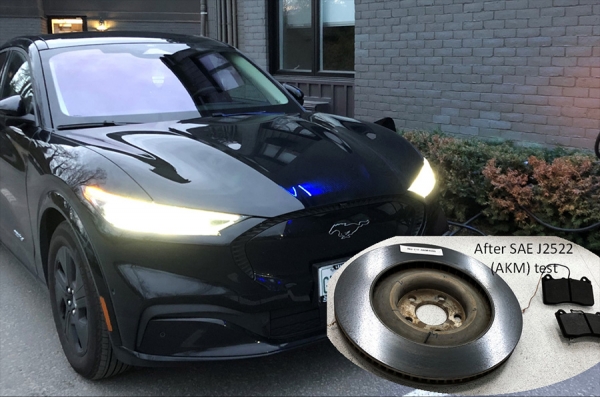A UWindsor engineering professor has joined forces with Ford Motor Co. of Canada and auto parts manufacturer NUCAP Industries on a $1.14 million research project to develop an environmentally friendly brake rotor that would last the lifetime of your car.
Xueyuan Nie is developing a cost-effective coating technology to make brake rotors resistant to corrosion and reduce emissions from wear. Ford proposes to one day use the rotors on its line of electric vehicles, making those vehicles even greener by eliminating the pollution caused by braking.
"This project will assist auto manufacturers and parts suppliers to get closer to producing real emission-free vehicles, towards the goal of electromobility for everyone," Dr. Nie said.
Emissions from vehicles don’t come only from their tailpipes. Non-exhaust emissions (NEE) such as brake dust account for nearly half of all particulate matter emitted from vehicles, Nie explained. The United Nations has a working group looking into NEE.
"Having successfully implemented policies limiting tailpipe exhaust emissions, legislators are now turning their attention towards brake emissions. In that sense, this is an important project."
Rotors are cast iron discs connected to each wheel. Calipers squeeze brake pads against the rotors, causing friction that stops the vehicle.
Nie’s model uses a technology called plasma electrolytic aluminating to coat the brake rotors with hard ceramic. The coating will make the rotors resistant to rust. The lack of corrosion will allow brakes to react faster, decreasing braking distance. It will reduce sticking and slippage, making braking smoother and more comfortable for passengers. As an added plus, it will keep wheel rims cleaner.
"There are a lot of benefits from the customer’s point of view," said Nie. "All of society will benefit from a sustainability standpoint. When the rotors don’t have to be replaced, it reduces waste and demands fewer natural resources. Air and water quality will improve through the reduction of particles which means a cleaner environment and better lung health for humans."
Nie estimates the technology will add only 10 per cent to the cost of traditional cast iron brake rotors— an increase more than compensated for by eliminating the need to ever replace the rotors during the lifetime of a vehicle.
Bill Van Heyst, UWindsor’s dean of engineering, said the project is an important one.
"Dr. Nie’s work on making brake rotors more sustainable is just another example of how engineers, partnering with industry, can move traditional manufacturing processes and parts into a more environmentally sound space," Dr. Van Heyst said. "This type of process re-imagining is critical in achieving a zero-emissions car of the future."
Nie, an expert in micro- and nanoscale mechanics, corrosion, plasma surface engineering, and thin films and coatings, has been partnering with Ford for more than a decade. Their collaboration on this project will also involve NUCAP Industries Inc., an auto parts manufacturer whose newly designed brake pads will be used to test the coated rotors.
The $1.14 million project is being funded through a grant from the Natural Sciences and Engineering Research Council of Canada of $500,000 over three years. Ford and NUCAP will contribute $83,333 a year to the project and $130,000 a year of in-kind support.
For the project, a doctoral candidate, a Master’s student, and an undergraduate student will work with a research associate on the project alongside Nie, helping to train the next generation of engineering researchers.
—Sarah Sacheli

